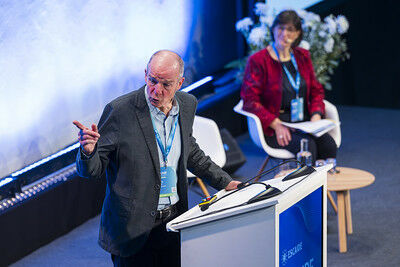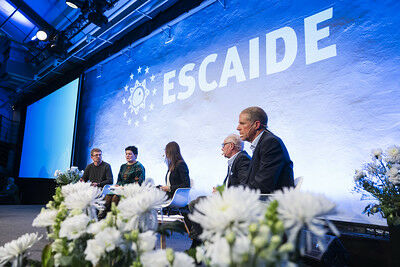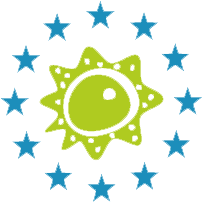ESCAIDE 2024 - A summary of day 1
ESCAIDE 2024 began today with sessions on striking a balance between prevention and cure, the benefits of mobile labs in outbreak detection and preparedness, and public health challenges in times of conflict.

ESCAIDE 2024 kicked off with an opening ceremony featuring opening remarks by ECDC Director Pamela Rendi-Wagner and ECDC Chief Scientist Piotr Kramarz. In her speech, Rendi-Wagner emphasised the importance of prevention, trust in public health institutions, and communicating effectively with a broader audience.
In the first plenary session on the role of prevention vs cure in public health, Professor of Epidemiology Chris Dye drew insights from across disciplines to highlight the importance of prevention, and how to better prioritise it. According to Dye, there is a reluctance to spend money on prevention, and there needs to be a realignment of incentives for better prevention in order to shift policy away from healthcare, and focus instead on health.
“A lot of prevention happens outside the health sector, which highlights that we need to work closer with other sectors.” - Chris Dye, Professor of Epidemiology at the University of Oxford, speaking in Plenary A

In his presentation, Dye reinforced that it is difficult to make the case for health, and people tend to act on issues when it is too late. He emphasised the role of perception in people’s health choices. Using the example of a young smoker who is unlikely to think of dying of lung cancer, Dye stressed that health choices are not just based on facts, but also perception and values.
Dye explained that unusual events can be used to make people think about broader problems, and help create an incentive to emphasise health. For example, in the case of gun control in the United States, the events that attract the most attention are mass shootings, even though more people are killed by gun violence.
“Unless we understand how people really make choices about health we cannot give the right incentives.” - Chris Dye, Professor of Epidemiology at the University of Oxford, speaking in Plenary A
In the first side session of this year's ESCAIDE, speakers discussed the development and deployment of mobile laboratories, which offer several advantages for preparedness and response in areas that are remote and/or lack diagnostic capacity. Moderator Florian Gehrer presented the EU-funded MOBILISE project, which is working on developing and deploying green mobile labs that support a One Health approach.
Presenter Muna Affara then showcased a mobile laboratory project in East Africa that supported the response to viral haemorrhagic fever outbreaks, is now focusing on surveillance and response to antimicrobial resistance, and will also include veterinary labs with a One Health approach.
Laurence Flevaud from Médecins sans Frontières described mobile laboratories as essential to public health, helping MSF detect outbreaks more quickly, and providing testing capacity in remote areas. Finally, Kym Antonation from the Public Health Agency of Canada (PHAC) described past uses of mobile laboratories in Canada, which range from mobile laboratories deployed in freezing cold Nunavut to detect tuberculosis, to a ‘hockey bag’ with equipment used in the Democratic Republic of Congo for viral haemorrhagic fevers.
In the last plenary of the day, a panel of speakers discussed the public health challenges during the war in Ukraine. Ihor Kuzin, Ukraine’s Deputy Health Minister, began the plenary by explaining the war’s unprecedented effect on public health. There was disruption of access to healthcare, population displacement, injuries and illnesses, the deterioration of sanitary and epidemiological conditions, bioterrorism and nuclear risks, as well as significant mental distress. Ukraine’s healthcare infrastructure has also been disrupted or destroyed.
“We continue to fight and remember that our fight extends beyond the Ukrainian borders. We stand for democracy, rule of law and human rights. “ - Olga Gvozdetska, Deputy Director General at the Ukrainian Ministry of Health, speaking in Plenary B

When it came to lessons learned, Kuzin highlighted the importance of developing response and contingency plans for healthcare facilities in the case of internet outages, decentralizing services, using simulation exercises in full scale mode, developing effective blood management systems, ensuring management of chronic disease and continuity of care for HIV and tuberculosis, and developing a clear health communications strategy.
Olga Gvozdetska, who is the Deputy Director General of the Public Health Center at the Ukrainian Ministry of Health, emphasised that “the war has changed everything”, but stated that Ukraine has been able to meet the challenges, by ensuring availability of services, returning patients to medical surveillance, and ensuring the availability of medicines and reagents.
Finally, Katarzyna Drążek-Laskowska from Poland’s Ministry of Health spoke about Poland’s support to Ukrainian refugees. Drążek-Laskowska explained that the same healthcare services available to Polish citizens have been offered to Ukrainians. Ukrainian healthcare staff were also allowed to practice in Poland. Support also included innovative IT solutions, vaccination support and information campaigns, and a medical evacuation hub.
“The Ukrainian crisis is an example of international solidarity.” - Katarzyna Drążek-Laskowska, Director of the Department of International Cooperation of the Ministry of Health in Poland, speaking in Plenary B
